Welcome to animals that start with Q.
It took a bit of searching, but we’ve made a list of 20 animals that start with the letter Q. You can check them out.

Jump to any Animal or read the entire list below.
Overview of animals that start with Q
1. Qinling Panda
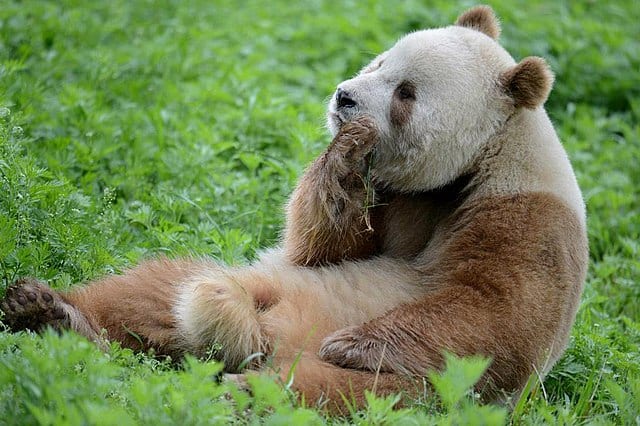
| Scientific Name | Ailuropoda melanoleuca qinlingensis |
| Where It Lives | Qinling Mountains, China |
| What It Eats | Bamboo |
| Conservation Status | Endangered |
Fun Fact: Qinling pandas are rare, as there are less than 200 individuals in the wild.
Qinling pandas, also known as brown pandas, are a subspecies of the giant panda. They have a brown coat and a back of brown below their eyes rather than around it like other panda species. Bamboo is their primary source of nutrition; however, bamboo is not very nutrient-rich, so they spend around 14 hours a day eating bamboo.
2. Quacking Frog
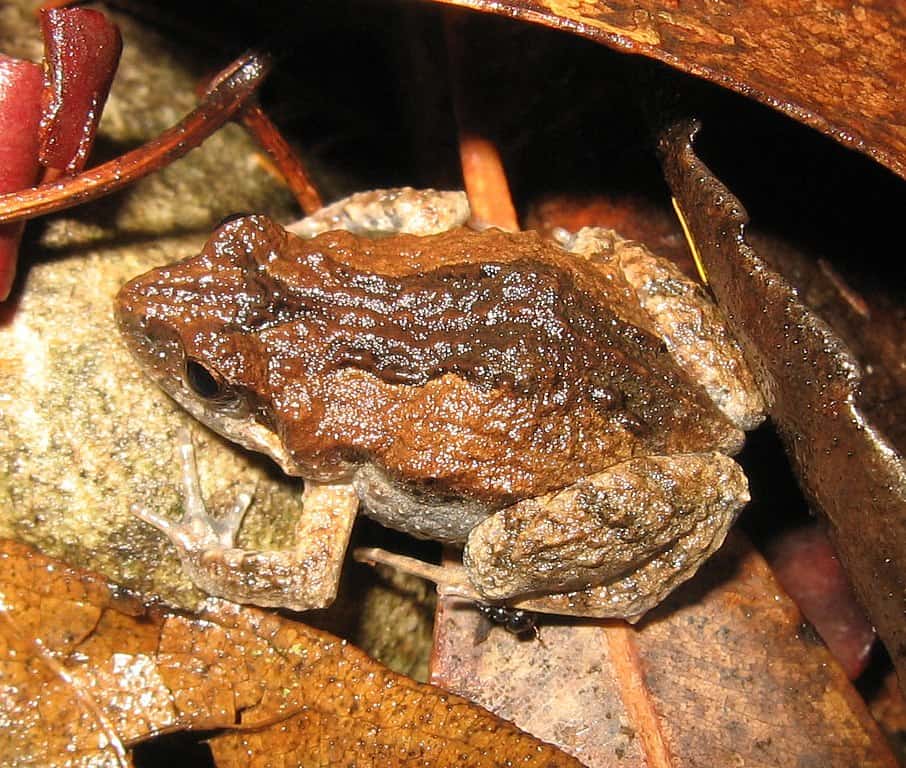
| Scientific Name | Crinia georgiana |
| Where It Lives | Southwest Western Australia |
| What It Eats | Insects, snails, spiders |
| Conservation Status | Least concern |
Fun Fact: The quacking frog’s mating seems affected by moon phases, as there is a high mating level during the full moon.
Quacking frogs are endemic to Australia. As their name suggests, their mating call sounds like a duck’s quack. They vary in color, being orange, gray, or brown with marbling or stripes on their skin. Females typically have white abdomens.
3. Quagga
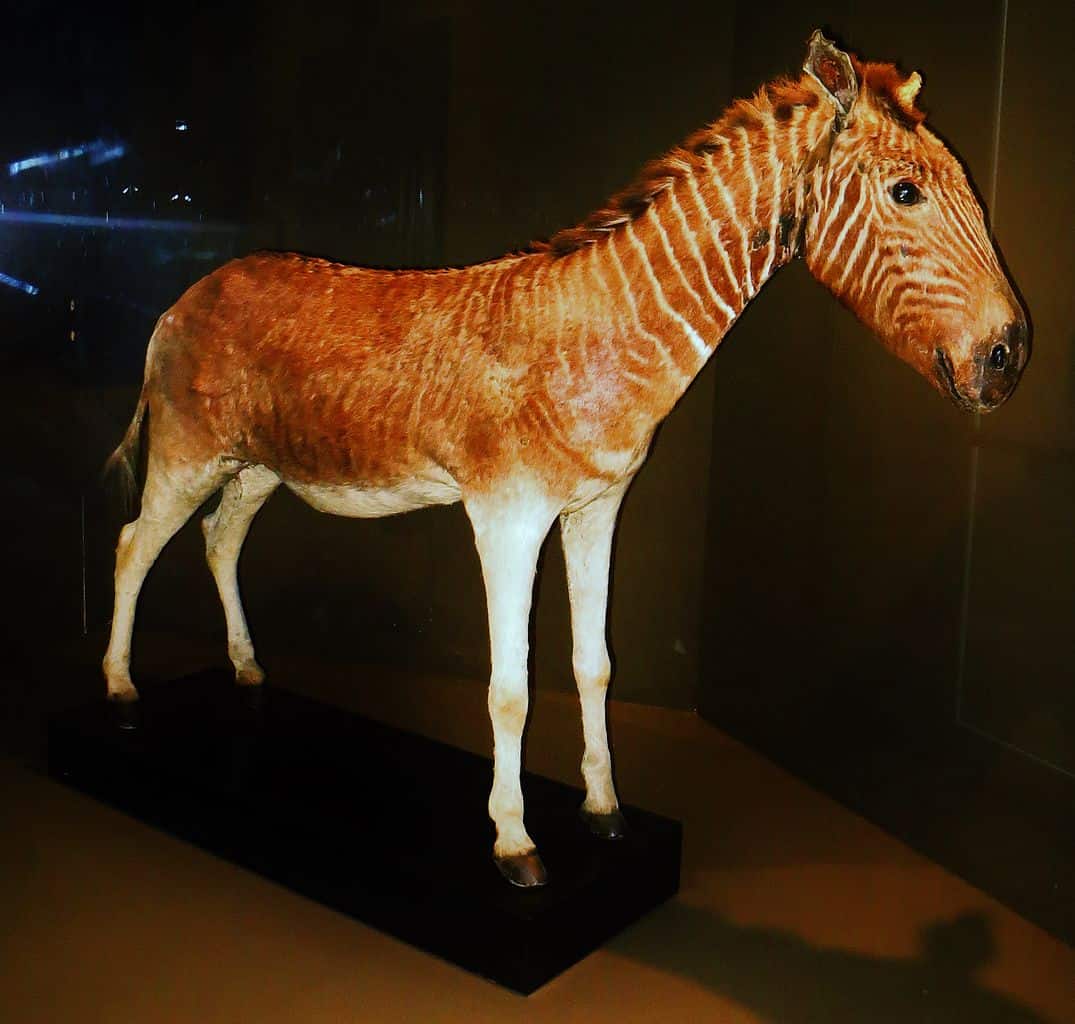
| Scientific Name | Equus quagga quagga |
| Where It Lived | South Africa |
| What It Ate | Grasses, shrubs |
| Conservation Status | Extinct |
Fun Fact: A Quagga herd always kept one individual as a guard while they slept.
Quaggas were a subspecies of zebra that appeared to be half-zebra and half-donkey. They were characterized by their brown skin and white stripes that appeared only on their upper torso and head. The last quagga died in captivity in 1883. They were unfortunately hunted to extinction.
4. Quagga Catshark

| Scientific Name | Halaelurus quagga |
| Where It Lives | Arabian Sea |
| What It Eats | Deep-living shrimps |
| Conservation Status | Data deficient |
Fun Fact: The Quagga Catshark gets its name from its stripes that resemble a quagga.
Quagga catsharks are a species of bottom-dwellers that have been found off the coasts of southwestern India and eastern Somalia. Only nine specimens have ever been caught. They have pointed snouts and dorsally-placed eyes and gill slots.
5. Quahog
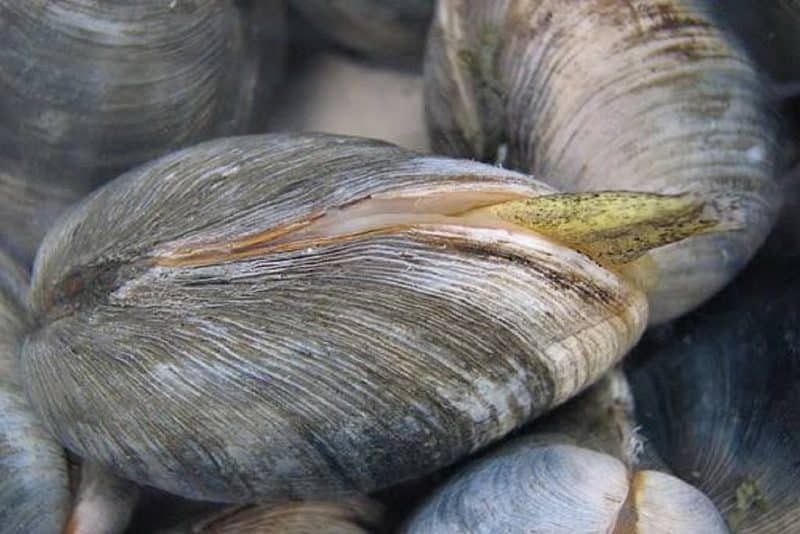
| Scientific Name | Mercenaria mercenaria |
| Where It Lives | North & Central America |
| What It Eats | Particulate matter |
| Conservation Status | Least concern |
Fun fact: Quahogs mate by releasing their gametes into the surrounding water.
Quahog, otherwise known as hard clams, are a species of hard-shelled clams that inhabit the eastern shores of North and Central America. They are commonly served as food in restaurants around areas where they can commonly be caught. They are filter feeders and may be toxic to humans if they ingest toxins like red tide.
6. Quail

| Scientific Name | 12 genera |
| Where It Lives | Worldwide, except Antarctica |
| What It Eats | Seeds, greens, insects |
| Conservation Status | Some species threatened/endangered |
Fun Fact: Quail hens can lay an average of 200 eggs annually.
Quails are game birds and are widely distributed around the world. They were domesticated primarily for their meat and eggs. They don’t look like it, but they can fly nearly 40 miles per hour over short distances.
7. Quebrada Valverde Salamander
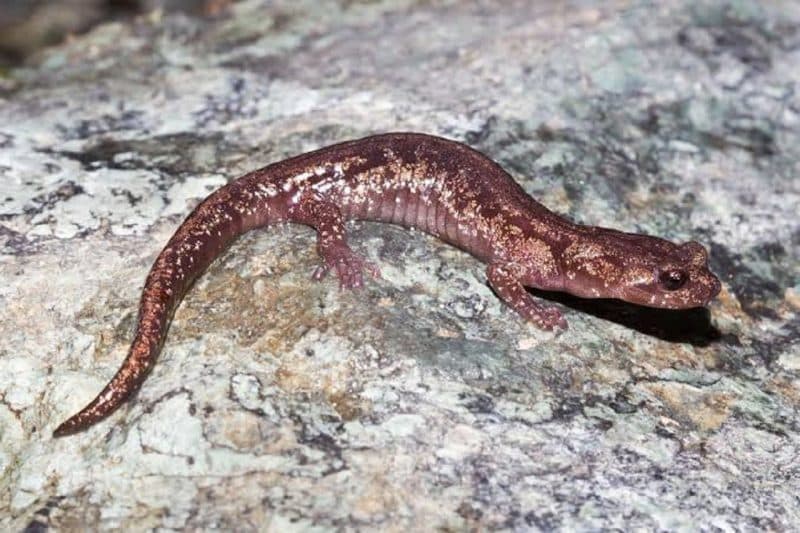
| Scientific Name | Bolitoglossa diminuta |
| Where It Lives | Costa Rica |
| What It Eats | Insects, spiders, worms |
| Conservation Status | Least concern |
Fun Fact: The Quebrada Valverde Salamander doesn’t have lungs but breathes through its moist skin.
Quebrada Valverde Salamanders are endemic to Costa Rica. They live close to bodies of water or in moist tropical to subtropical forests. “Quebrada”: means “ravine” and “Valverde” means “meadow.”
8. Quechuan Hocicudo
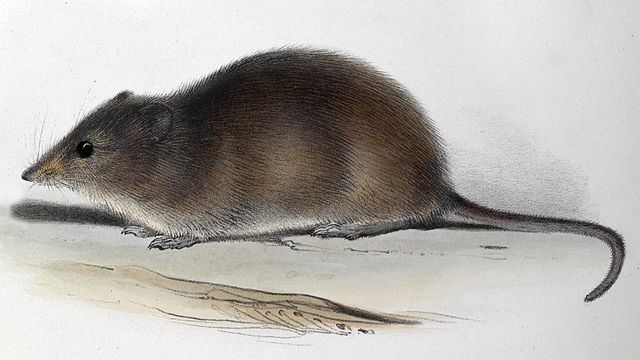
| Scientific Name | Oxymycterus hucucha |
| Where It Lives | Andes |
| What It Eats | Invertebrates, arthropods |
| Conservation Status | Endangered |
Fun Fact: Due to its small distribution and destroying habitat, the Quechuan Hocicudo is classified as endangered.
Quechuan Hocicudos are fairly small rodents. These animals live in the cloud forests, which are very wet and mossy forests, at an elevation of 8,500-9,800 ft (2,600-3,000 m) above sea level in a small region in the Andes Mountains.
9. Queen Alexandra’s Birdwing
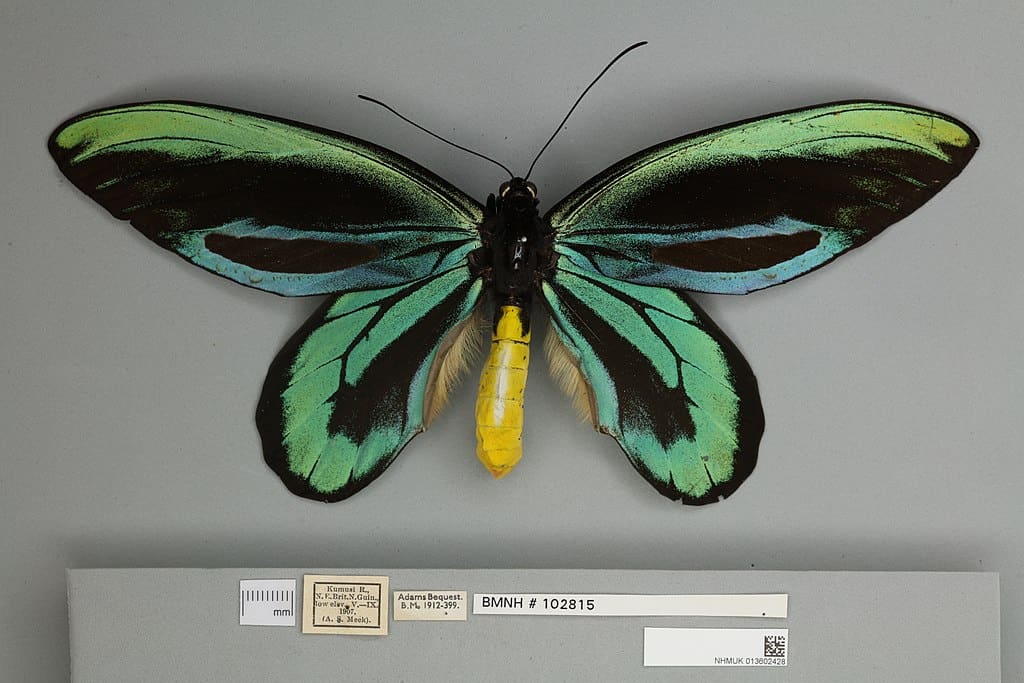
| Scientific Name | Ornithoptera alexandrae |
| Where It Lives | Papua New Guinea |
| What It Eats | Flower nectar |
| Conservation Status | Endangered` |
Fun Fact: These butterflies fly so high during the day that early collectors hunted them with small shotguns.
Queen Alexandra’s birdwing butterflies are the largest species of butterfly in the world. Their wingspans can reach 9.8-11 inches (25-28 cm), with some exceeding that. They are endemic to the forests of the Oro Province of Papua New Guinea.
10. Queen Angelfish
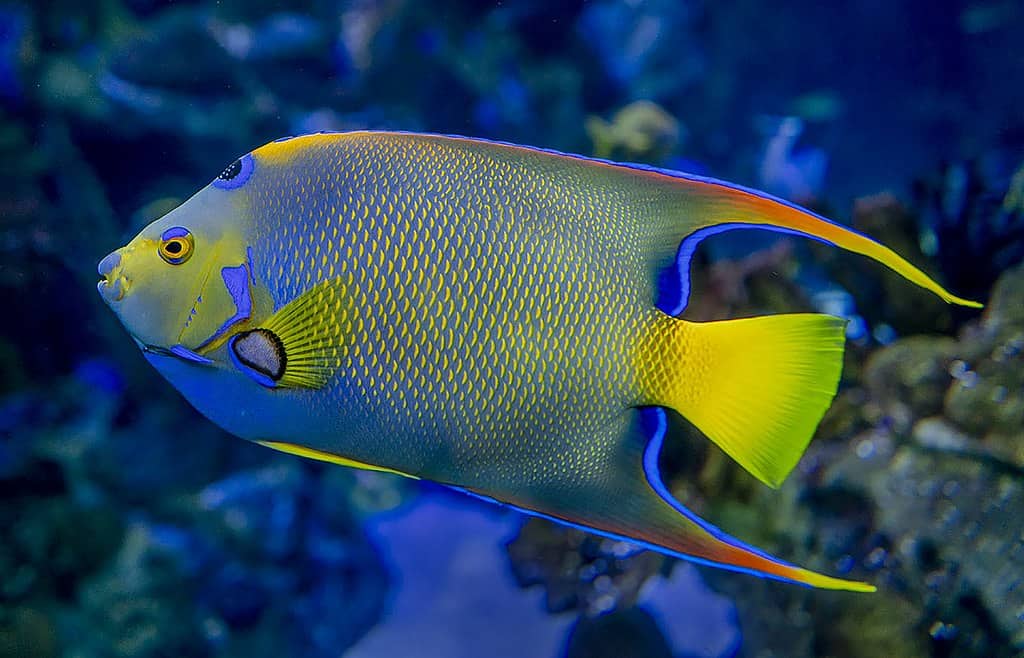
| Scientific Name | Holacanthus ciliaris |
| Where It Lives | Coasts of the Americas |
| What It Eats | Sponges, plankton, jellyfish, algae |
| Conservation Status | Least concern |
Fun Fact: Female queen angelfishes can discharge up to seventy-five thousand eggs in an evening of mating.
Queen angelfishes are a beautiful fish species that live in the western Atlantic Ocean coral reefs. They are colored bright and beautiful blue and yellow shades and are in high demand for aquariums.
11. Queen Snake
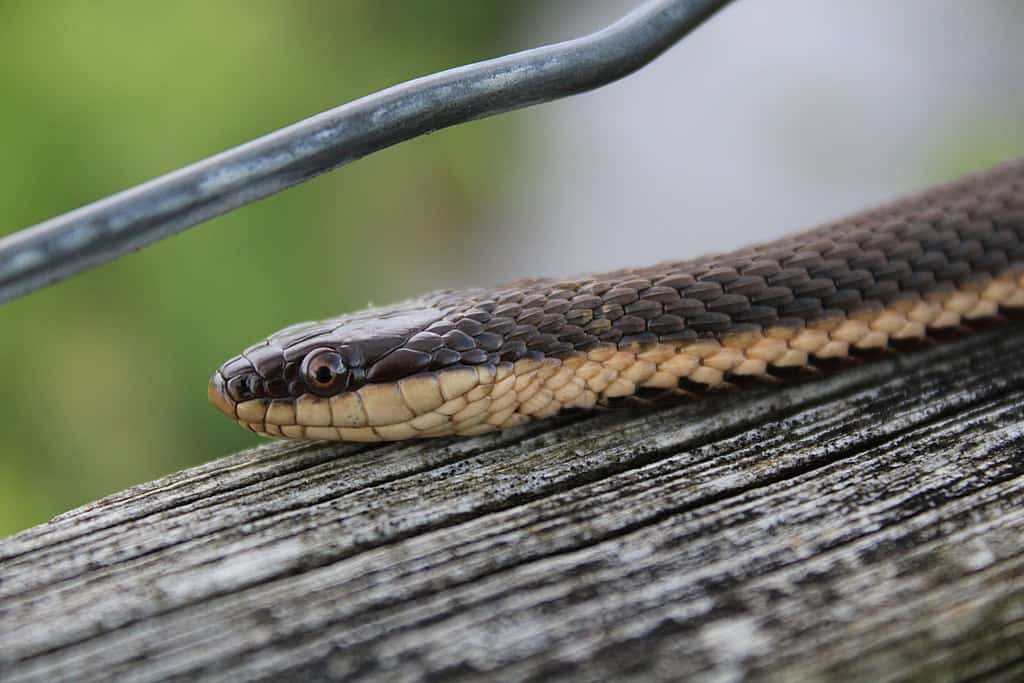
| Scientific Name | Regina septemvittata |
| Where It Lives | North America |
| What It Eats | Crayfish, small fish |
| Conservation Status | Least concern |
Fun Fact: The Queen Snake hunts its prey by tracking its scent with its sensitive tongue.
Queen snakes inhabit the temperate regions of North America, including New York, Wisconsin, Alabama, and northern Florida. They are non-venomous, semi-aquatic, and resemble garter snakes in appearance. These snakes stay close to clean running water or watersheds.
12. Queen Snapper

| Scientific Name | Etelis oculatus |
| Where It Lives | Western Atlantic Ocean |
| What It Eats | Fish, squid |
| Conservation Status | Data deficient |
Fun Fact: The maximum recorded length of a queen snapper is thirty-nine inches.
Queen snappers are easily identifiable by their bright red and pinkish skin. They live in the western Atlantic Ocean and are the only species in the genus (Etelis) to not live in the Indo-Pacific Ocean. It is possible that the population numbers are in decline due to overfishing; however, there is not yet enough data on their numbers.
13. Queen Triggerfish
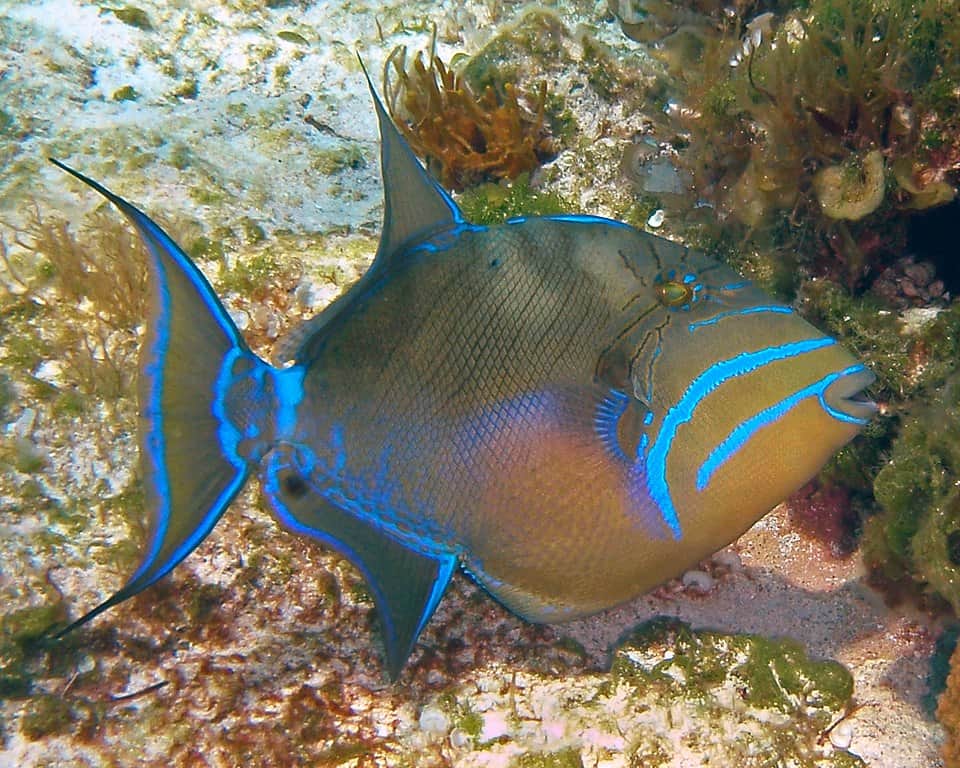
| Scientific Name | Balistes vetula |
| Where It Lives | Atlantic Ocean |
| What It Eats | Sea urchins, invertebrates |
| Conservation Status | Near threatened |
Fun Fact: Queen triggerfishes can change colors when under stress.
Queen Triggerfishes, also known as old wives, inhabit the western Atlantic Ocean, commonly in coral and rocky reefs. They feature remarkably right colors, and they are often caught for aquariums.
14. Queensland Grouper
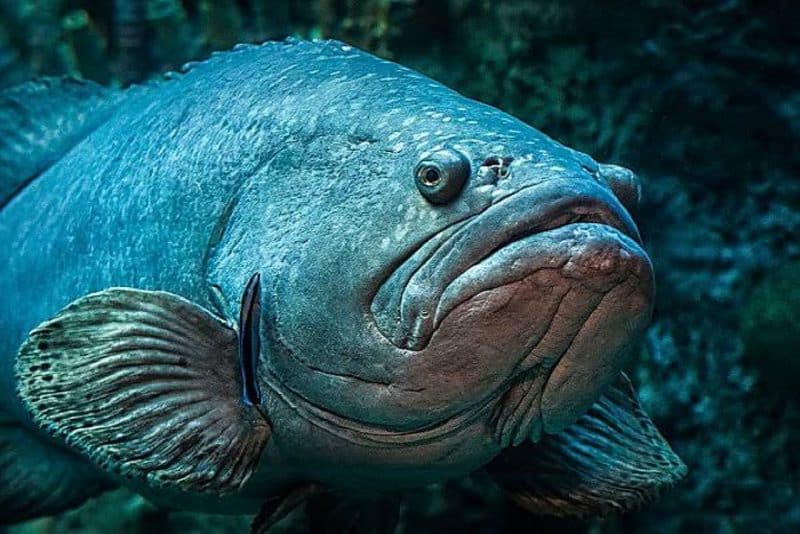
| Scientific Name | Epinephelus lanceolatus |
| Where It Lives | Indo-Pacific Ocean |
| What It Eats | Fish, small sharks, crustaceans |
| Conservation Status | Data deficient |
Fun Fact: Queensland groupers swallow all their prey, which include small sharks and sea turtles, whole.
Queensland groupers, also known as giant groupers, are one of the largest species of bony fish, weighing up to 880 lbs (400 kg). They have a wide distribution in the Indian and Pacific Oceans and typically stay in shallow waters.
15. Queensland Tube-Nosed Bat
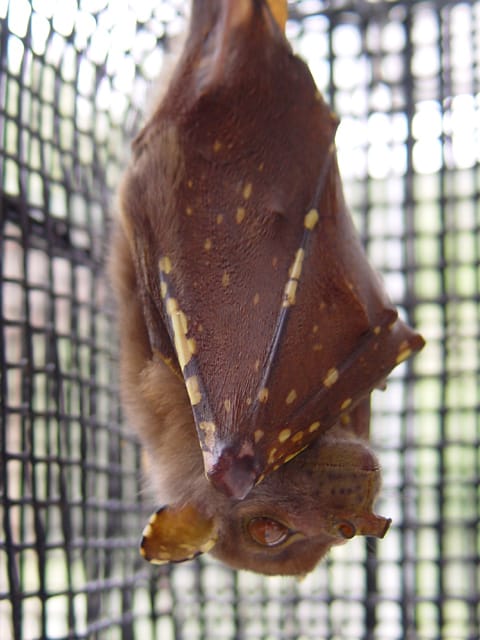
| Scientific Name | Nyctimene robinsoni |
| Where It Lives | Northeastern Australia |
| What It Eats | Fruit, nectar |
| Conservation Status | Least concern |
Fun Fact: Queensland Tube-Nosed Bats have never been observed drinking water.
Queensland tube-nosed bats are endemic to Northeastern Australia. They are brown with yellow spotting and have two tubular nostrils that project from their snouts. They are fructivores and only consume fruit and nectar.
16. Queensland Lungfish
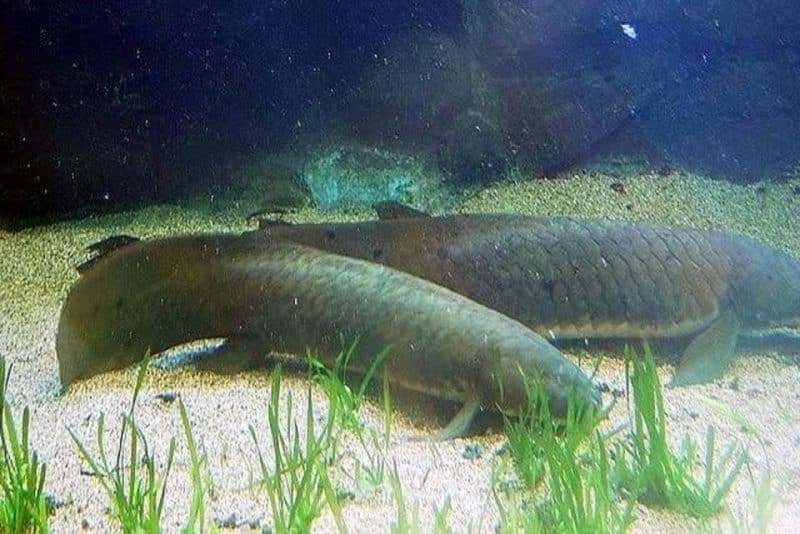
| Scientific Name | Neoceratodus forsteri |
| Where It Lives | Northeastern Australia |
| What It Eats | x |
| Conservation Status | Endangered |
Fun Fact: Queensland lungfishes are “living fossils” and one of the oldest living vertebrates on the planet, having been around since about 380 million years ago.
Queensland lungfishes. also known as Australian lungfishes, are endemic to southeastern Queensland in Australia. They are called lungfishes because they have lungs they use to breathe oxygen in addition to their gills. This helps them survive the Australian dry season.
17. Quelea
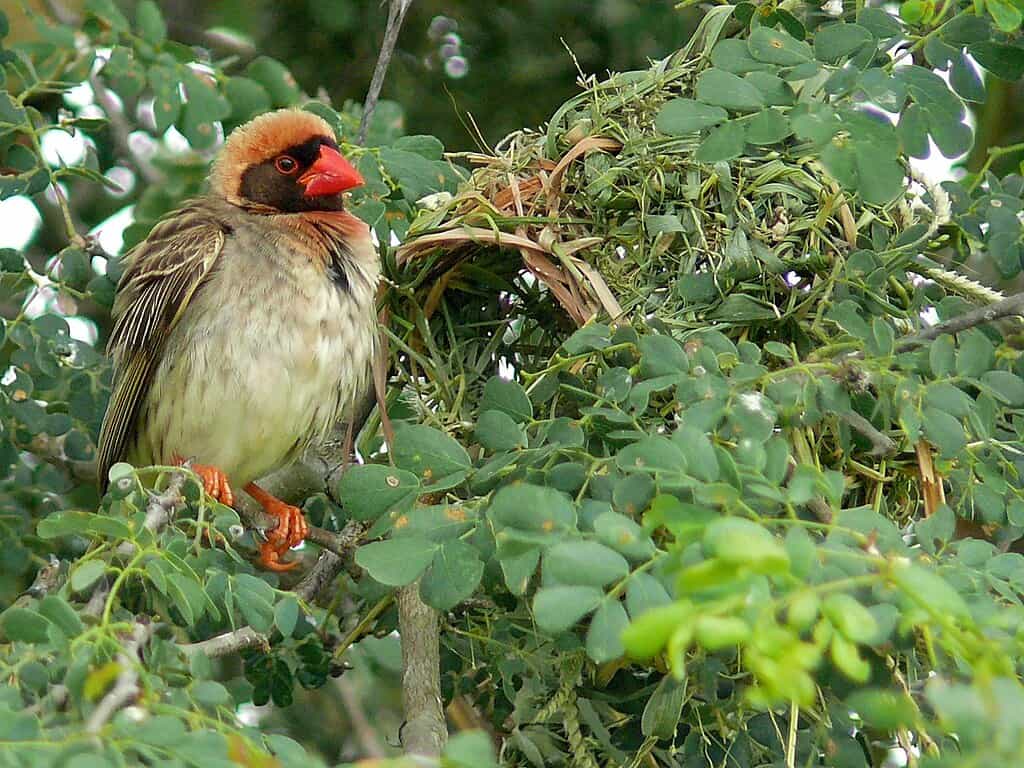
| Scientific Name | Quelea spp. |
| Where It Lives | Sub-Saharan Africa |
| What It Eats | Seeds |
| Conservation Status | Least concern |
Fun Fact: Queleas are the most populous undomesticated birds globally, with a population of 1.5 billion.
Queleas, pronounced “kwee-lee-uhs,” are a genus of small birds found throughout Sub-Saharan Africa. In places where they are common, they have been nicknamed the feathered locusts because they are major pests to grain, corn, and rice fields.
18. Quetzal
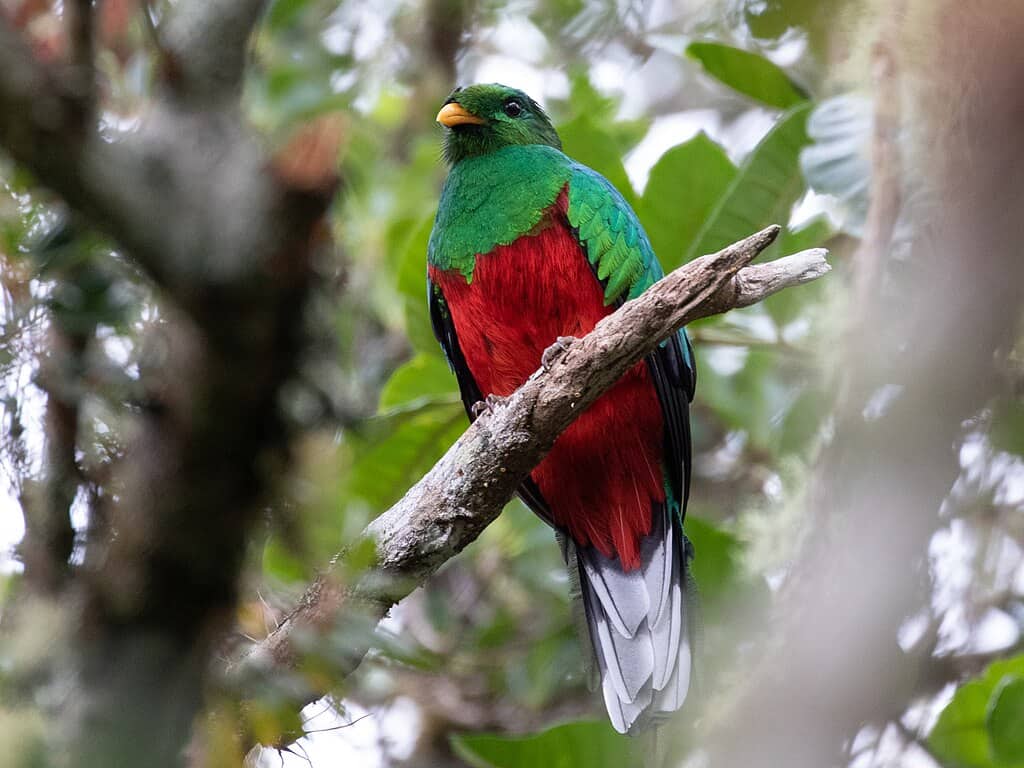
| Scientific Name | 2 genera, 6 spp. |
| Where It Lives | Neotropical America |
| What It Eats | Fruits, berries, insects |
| Conservation Status | Near threatened |
Fun Fact: Male quetzal tail feathers can get as long as one meter.
Quetzals, pronounced “ket-sils,” live in the rainforests of North, Central, and South America. The resplendent quetzal is the national bird of Guatemala. Quetzals are brightly colored, with golden green crests and deep red breast feathers.
19. Quokka
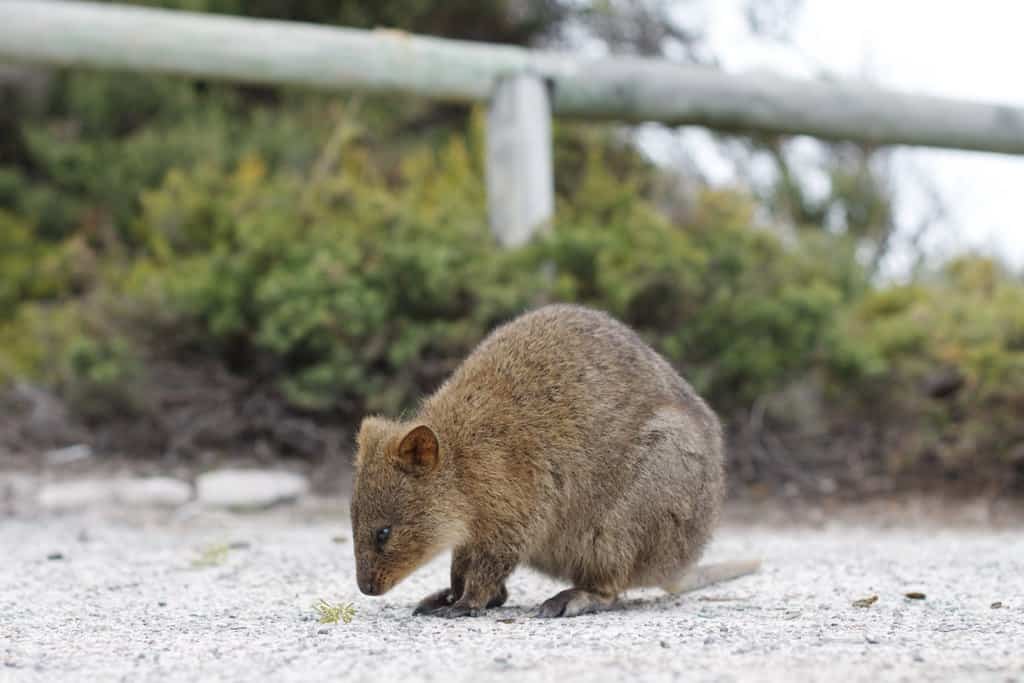
| Scientific Name | Setonix brachyurus |
| Where It Lives | Southwestern Australia |
| What It Eats | Grasses, sedges, leaves |
| Conservation Status | Vulnerable |
Fun Fact: Quokkas can go months without water.
Quokkas are small marsupials endemic to a small region in Australia and on a few islands just off the Australian coast. These animals are one of the smallest species of wallabies in the world, and are known for their happy dispositions. They hop through tunnels in long grasses to evade snakes, their primary predators.
20. Quoll
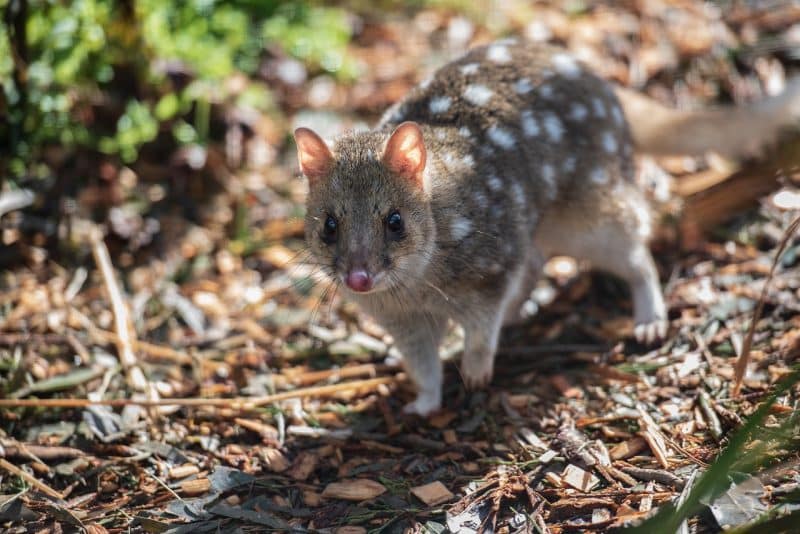
| Scientific Name | Didelphis maculata |
| Where It Lives | Australia, New Guinea |
| What It Eats | Smaller mammals, birds, insects |
| Conservation Status | Near threatened |
Fun Fact: Quolls are aggressive and ferocious despite their size and appearance.
Quolls are carnivorous but cute marsupials indigenous to Australia and New Guinea. They are nocturnal and a good at climbing trees. With their soft spotted fur coats, these animals look like dainty eaters but eat anything they find alive or dead.
Summary of animals that Start with Q
That’s it for animals that start with the letter Q.
Get the full Animal Alphabet here:
- Animals That Start With A
- Animals That Start With B
- Animals That Start With C
- Animals That Start With D
- Animals That Start With E
- Animals That Start With F
- Animals That Start With G
- Animals That Start With H
- Animals That Start With I
- Animals That Start With J
- Animals That Start With K
- Animals That Start With L
- Animals That Start With M
- Animals That Start With N
- Animals That Start With O
- Animals That Start With P
- Animals That Start With R
- Animals That Start With S
- Animals That Start With T
- Animals That Start With U
- Animals That Start With V
- Animals That Start With W
- Animals That Start With X
- Animals That Start With Y
- Animals That Start With Z
Thank you for reading!
Join our Forum for free today!

- These are The 5 Largest Great White Sharks Ever Recorded - July 19, 2024
- The Surprising Benefits of Big Game Hunting - July 18, 2024
- $100k+ Hunting Experiences The Most Expensive Animals to Pursue - July 17, 2024


